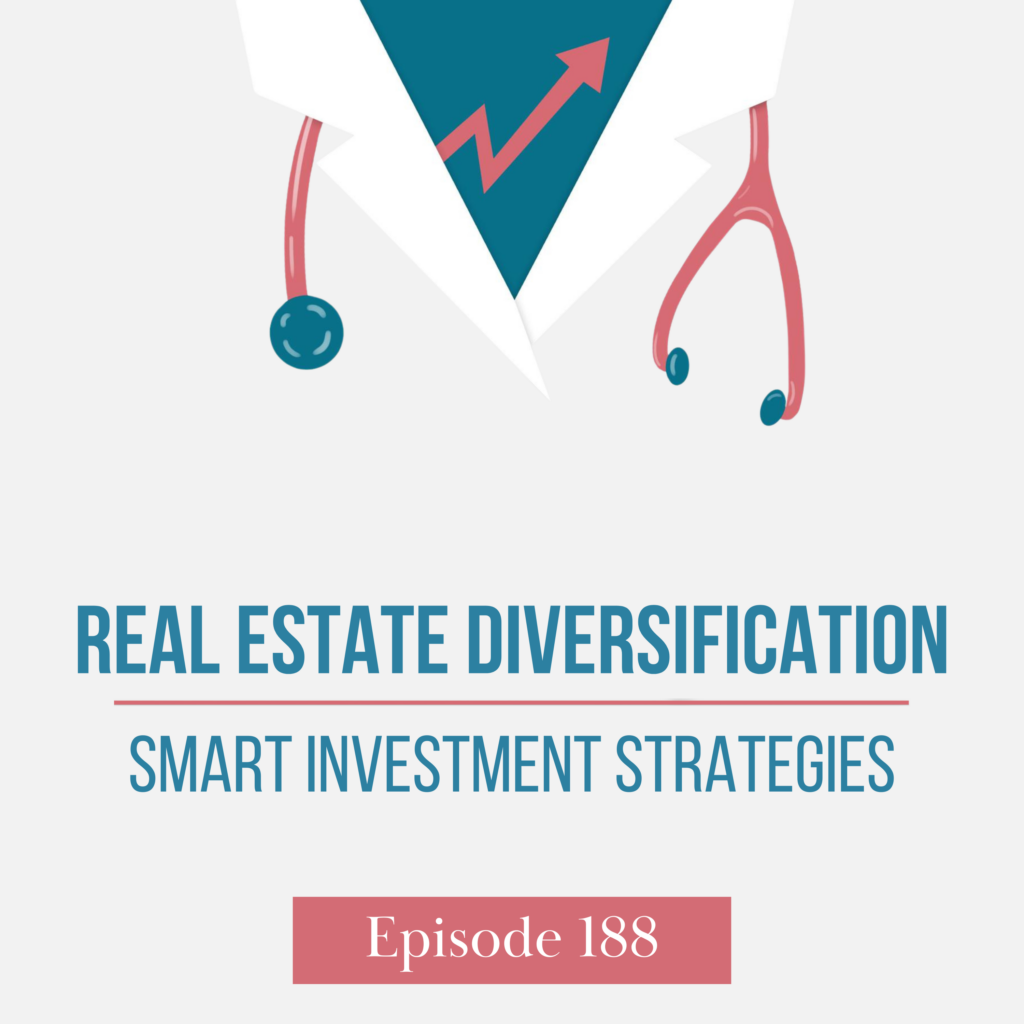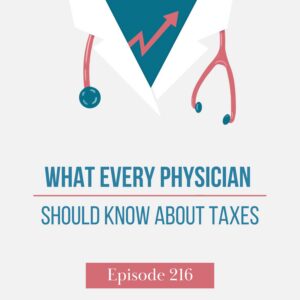- Jeff Wenger: LinkedIn
- Connect with me on my LinkedIn
- Contact Finance for Physicians
- Finance for Physicians
- To schedule a call with one of our awesome planners, book HERE.
Full Episode Transcript:
Jeff Wenger: If I was picking individual companies, kind of that rule of thumb would be, you need to have at least like 20 different things that you’re in and they need to be somewhat different from each other to be diverse. And I mean that’s not a perfect metric or rule, but in other words, to be diverse, I would want no more than 5% of my portfolio to be in something, in one single thing.
Welcome to Finance for Physicians, the show where we help physicians like you use money as a tool to live a great life. I’m your host, Daniel Wrenne, and I’ve spent the last decade advising physicians on their personal finances with the mission to help them understand that taking control of their finances now means creating a future where they can practice medicine where, when, and how long they want to.
Daniel Wrenne: Afternoon, Jeffrey.
Jeff Wenger: Hello there, Daniel. It’s great to be with you again.
Daniel Wrenne: Yeah. I really think this is going to be a fun conversation. I think it’s a little more exciting of a topic and that we’re gonna be talking about real estate. So I think it seems like it’s a hot topic. I like talking about it. I don’t know if it’s going to go the way people maybe expect it to go in terms of the conversation.
We’re going to be talking about diversification in real estate because it seems like that’s, a lot of times, not always, but a lot of times when we hear people are going to be, or interested in investing in real estate, a lot of times they’re like, because–’cause we’re always looking for the reasons behind it.
It’s like, “I want to get into real estate because I want to diversify my investments.” So we’re going to talk through how that actually works. Like is that a good reason in the first place? What is diversification? And what some of the alternatives might be. So, sound like a good plan, Jeff?
Jeff Wenger: Oh yeah, real estate and diversification. Love it.
Daniel Wrenne: Yeah, diversification, real estate. Yeah, we can handle that. Diversification, maybe we can start with diversification. ‘Cause I think, hopefully everybody listening knows exactly what diversification means. But it’d probably be good just to clarify. What are we talking about? What does diversification mean?
Jeff Wenger: Yeah. Diversification. I mean, if there’s one thing that I know about my portfolio, is that I need diversification.
Daniel Wrenne: Yeah. Seems like a good thing.
Jeff Wenger: I’ve heard that. And yeah, I mean, what diversification really means is that out of, right, all the money that you have invested, that only a portion of it is in any one thing.
Right. So if I have, let’s say if I have a hundred thousand dollars, diversification would be maybe have a thousand dollars in a hundred different things. So that’s diverse, right? And so I guess, does that hit at the core of it?
Daniel Wrenne: Yeah. I mean, it’s pretty simple. It’s like owning, I mean, the big picture of it is it’s owning lots of different types of a diverse of things.
It gets, you can get complicated with it. There’s lots of different like measures of diversification and there’s some investments that are more similar and less similar, but for the sake of simplicity, diversification, yeah, owning lots of different types of investments, the types part is important because it helps, especially when you own different types, you can own different investments. And sometimes they’re very similar and that’s not quite as good for diversification. So it’s best if you can own like different types of investments because, so example, maybe Apple’s like a massive company. And so you could own just Apple. Let’s just say you own a hundred percent of your investments are Apple.
That’s not very diversified. Versus if you own Apple and what’s Facebook’s company called? Meta. So those are both like tech companies. So they’re probably, they’re going to be pretty similar ish. And so that’s definitely diversified to own the two of those as opposed to just owning the one, but then you could take it a step further and own a manufacturing company or an international company.
And that’s even more diversified. Or you can own like thousands of companies. That’s like extremely diversified. Jeff’s portfolio, I’m sure has thousands and thousands of companies in it. He’s very diversified.
Jeff Wenger: It does. Very diverse, but also very simple. Because really, I think we only have five components in my portfolio.
Daniel Wrenne: Yeah, that’s the key.
Jeff Wenger: But out of that, there are basically every company that’s publicly traded in the world is in there. So in our, the firm Daniel and I work together at a financial planning firm and we do investments, surprise. But yeah, what are the categories? So when we diversify and we put it into an investment portfolio, what’s a normal portfolio look like when we say ours is diverse?
Daniel Wrenne: Diversity. So when we’re diversifying our portfolios, so like an example might be like 90% bonds, 10% stocks. So within that 90%, there might be like. For our particular portfolio, 32% might be U.S. larger companies, 13% might be U.S. smaller companies, 29 or 28% would be international companies, 8% would be emerging markets. So not like the big developed countries, but more of the emerging international companies. And then 9% would be real estate and 10% would be bonds. And within those categories, our philosophy is to use a passive approach, which means we believe it’s better to own the entire market than to own or pick individual stocks, like the winners and the losers.
And so within each of those, we would be owning all the different stocks within that category, or as many stocks as possible within that category, like thousands, so that it’s like maximum diversified. And so going back to real estate, it’s important, I think, to realize or clarify, a lot of people even if it’s not us, even if it’s just your 401k, probably the majority of people already own real estate. Sometimes they don’t realize it. And so understanding, I guess, for starters, like what you own in the first place is probably worthwhile. And then going, so where is that question coming from?
Like I want to diversify by owning real estate. I think what people have in mind with that question is they think of, they have this stock portfolio, like a traditional stock portfolio or 401ks or whatever, that’s like they don’t see the money at all. And a lot of times I think they’re looking at it like I’m going to alternatively own this real like asset like that I can see and it’s in my neighborhood and I can go knock on the door and it’s in an area, I don’t know. I think that in people’s mind might mean diversification, but what do you think, Jeff? What do you think people are thinking when they’re saying that?
Jeff Wenger: Yeah, I’d agree. I’d say that generally speaking, when they say diversify from the stock market or from the markets that they’re thinking, we almost think of the stock market as one thing. And so it’s like all my money is in the stock market. And so thinking of it, “Yeah, there’s a tangible thing. I can see that house. I can go break the window.” Probably don’t do that to your real estate investment.
Daniel Wrenne: Yeah. Why would you do that?
Jeff Wenger: But yeah, so I think when I–and then maybe back to that diversification idea, like when I’m thinking of diversification in, if I’m doing it in my portfolio, you were mentioning Apple and Facebook and some energy company. I can’t remember which one or manufacturing.
Daniel Wrenne: I didn’t even say one because I couldn’t think of one.
Jeff Wenger: Oh, okay.
Daniel Wrenne: Just because there’s a million and I can’t think of one.
Jeff Wenger: Yeah. Analysis paralysis right there before our eyes. But so like those funds that you mentioned, like Jeff has this total market fund, like that has 3,500 funds in it or 3 500 stocks in it, basically something like that.
If I was picking individual companies, kind of that rule of thumb would be you need to have at least like 20 different things that you’re in. And they need to be somewhat different from each other to be diverse. And I mean, that’s not a perfect metric or rule, but in other words, I would, to be diverse, I would want no more than 5% of my portfolio to be in something, in one single thing. And that’s the starting point.
Daniel Wrenne: You don’t want to have concentration greater than 5% in any one single thing. Is that what you’re saying?
Jeff Wenger: Right. Yeah. Right. So If it’s Apple, I don’t want more than 5% of what I own to be an Apple, because even that sounds like a lot when you have so many companies that are out there, but it is a big company.
So that’s okay. But it’s, if Apple has a bad year, Apple goes under, that’s only 5% of what I own is gone or something like that. And that’s where I think we get into this diversification idea when we start to add real estate or owning individual properties into that equation.
Daniel Wrenne: Yeah. And so I was just curious. I was looking at the Vang, you mentioned the Vanguard totals or the total stock market.
Jeff Wenger: How close were we?
Daniel Wrenne: Well, I was looking at the total number of stocks within it. And so the Vanguard total stock market, just as an example, that’s a mutual fund or it can be an ETF, but that particular investment vehicle has 3,654 stocks owned within it.
Jeff Wenger: I was off by 164.
Daniel Wrenne: Come on. Next time. I’ll let you memorize that. But also what’s interesting, so this is why I said earlier, most people in real estate don’t realize it. Within the Vanguard total stock market, 2.9% of that stock is real estate stocks. So if you have the Vanguard total stock market, which a ton of people have, you already own real estate. Because 2.9% of that is real estate. The other thing too, is like, what is that real estate? What does that mean when you own real estate in a Vanguard total stock market?
Jeff Wenger: Oh yeah. ‘Cause in the real estate, so there’s a type of investment fund called a REIT, real estate investment trust. And there are tons of those out there that are publicly traded as well, but that’s where a fund goes and invests in different types of real estate. So the Vanguard real estate fund, so there’s a specific fund for real estate that Vanguard has, but even within what’s in that total market, it’s investing in medical facilities, not just one medical facility, many medical facilities, storage units, office buildings, single family homes, all that stuff, apartment buildings with tons of those involved in that. That’s diverse. That’s a diverse real estate holding, right?
Daniel Wrenne: Right. And that, so we’re kind of, hopefully you’re catching our drift a little bit, but the, it could be that your Vanguard total stock market fund, I already said it, owns some real estate and it’s 2% or whatever. And it could be that the Vanguard, the real estate portion of it already owns the house down the street you’re talking about as far as your real estate investment.
I mean, like it’s not going to, but in theory or not in theory, in practice, in reality, it does own all kinds of different real estate investments. Like it owns lots, mass rental properties. It owns big, huge commercial developments. It owns industrial. It owns all the different, not only does it own a ton of different real estate, it owns all the different sectors because there’s a bunch of different types of real estate within real estate.
There’s multifamily. There’s like single, there’s a single family, there’s a commercial and industrial and all the different types, big, large, small. And so it owns all the different types of real estate within that. So to me, that sounds, I mean, that’s the definition of diversification.
[Midroll] Let’s take a quick break to talk about our firm, Wrenne Financial Planning. The goal of our podcast is to empower you to make better financial decisions. But sometimes the best financial decision you can make is to work with someone who understands your financial goals and has the expertise to keep you on track to reach them.
That’s where Wrenne Financial Planning comes in. We are a full-service financial planning firm that works with over 400 physicians and their families across the country. We charge a transparent monthly flat fee for our services and offer virtual meetings you can take from anywhere. Best of all, you’ll get to work with a team that specializes in working with physician families.
So whether you’re starting out and wondering how you’ll balance your student loan payments and saving for a home, or you’re an established physician trying to figure out how to pay for your kid’s college and how much you need to save to reach financial freedom, we can help. I’ll put a link in the show notes to schedule a no-obligation meeting with one of our certified financial planners.
Wrenne Financial Planning LLC is a registered investment advisor. For more information about our firm, please visit wrennefinancial.com. That’s wrennefinancial.com.
Jeff Wenger: Yeah. Right, and if I can just add to that, I mean it owns it in multiple locations as well, right? You mentioned, it could be, wouldn’t that be, what a happenstance would that be if my total index fund owns the neighbor, like my house, the house next door.
Daniel Wrenne: That would be weird.
Jeff Wenger: Yeah. That’d be interesting.
Daniel Wrenne: Never know.
Jeff Wenger: But even if it does, I’m in Northeast Ohio, it owns stuff in California. It owns it in Florida. It owns it in Texas and probably even Alaska, North Dakota and all these other places. So that’s diversification as well within real estate.
Daniel Wrenne: Right. So, yeah, especially in real estate that type of location diversification is important in real estate because certain areas can do better or worse than other areas purely because of the location of it.
So that’s like even more diversification. So if you’re looking at it like that, then really buying the house down the street, if that’s where your mind’s going with it, offers zero, in fact, you’re going the other direction of diversifying. You’re concentrating. If that’s what you currently have, if you already own some real estate or if you were comparing to buying real estate fund and you’re, that’s another thing, like there’s all kinds of options.
So you got, I think it’s worthwhile to compare what the different types of real estate options are in the first place. And there’s a lot of different ways to own real estate.
Jeff Wenger: Yeah. While you’re talking about, let’s talk numbers a little bit. I think I made reference to that kind of rule of thumb. There’s a little bit of research that goes into that roughly 20, 20 positions equals diversification if they’re different from each other.
So it’s 5% of your portfolio could be in one thing and you could still consider yourself diverse. So let’s bring that down to, I’ll ask you, maybe I’ll tell you my experience here. The questions we have about diversifying from the stock market, I would say I tend to start fielding those when somebody has investments somewhere between a hundred and two hundred and fifty thousand dollars.
Daniel Wrenne: When that question starts to come up, you’re saying?
Jeff Wenger: When that starts to come up. Sometimes even earlier.
Daniel Wrenne: Yeah, I think that’s not uncommon. That’s probably, yeah, pretty common range. It definitely comes up earlier than that, but that would say that’s a safe bet is when people are at the six figure investments mark, they start to kind of talk about this kind of thing.
Jeff Wenger: Yeah. And so that’s where just in practice, when we’re saying diversification, that’s why I want to run the numbers on this briefly and say what do you think maybe the average kind of property somebody wants to buy costs?
Daniel Wrenne: Yeah. I mean, if it’s a single family home, which is like probably the most common thing. Maybe it’s, I don’t know now it’s 200,000 probably, but–
Jeff Wenger: yeah, I was just, I’m just going to spit ball on that 200, 250, somewhere in that range. And so I guess if you view that as the asset and you’re like, I got 250,000 of this single family home that I just bought and I’ve got a hundred thousand in investments. That’s definitely not diverse, but I know they’re in the real estate crowd, leverage is key, right”? And so maybe you’re putting down 20% as a real estate investor. So now 50,000 is going to real estate. And the rest of it is other person’s money, right? other people’s money that you’re leveraging. That’s still 50 out of 100, 50 percent of your portfolio that’s in one property
Daniel Wrenne: In one location,
Jeff Wenger: In one location. Yeah. So that’s where the question I would have is that’s not necessarily a–we’re not saying that’s not a good investment either. That’s not even the question we’re looking at.
It’s is that diversification? And that’s, I would say, that’s an absolute no brainer that no, we’re not diversifying in that case.
Daniel Wrenne: The answer is no. That’s concentration actually. And even that’s a good example to put it in context. Kind of in kind of put it to numbers, but you can, even at a smaller, even if you’re looking at smaller numbers, pretty much always it’s concentration because if you already have a properly diversified investment plan, which hopefully you do, hopefully you already have a solid investment plan and you know exactly what you’re investing in and it’s very well diversified.
If you’ve already got a solid investment plan, pretty much always buying into real estate is going to shift you a little bit towards back towards concentration. So it’s diversification on one side, concentration on the other. ‘Cause you’re kind of going all in on, or a little bit in even on one particular thing by doing it, it’s not like you were saying, it’s not bad, that doesn’t mean it’s a bad investment or a bad idea, it just means it’s not diversification.
And so it’s probably worthwhile to be aware. We see it so often. People bringing this up and like 99.9% of the cases, it’s actually concentration when it’s coming, people are coming at it from a view that it’s going to be good for diversification, right?
Jeff Wenger: Yeah. So my question then would be just, real quick, when would it be, we can do a whole nother episode sometime or on that, but what would be okay? When is it a good idea to look at real estate? Single properties.
Daniel Wrenne: That’s a, we’ll do five minutes of that, but I could talk about that for two or three hours.
Jeff Wenger: Yeah. Give me the three minute version. When’s it a good idea?
Daniel Wrenne: I mean, I think, at the core, I personally think it’s more about doing it for the right reasons. Because now, especially when you’re talking about actively getting into real estate, there’s different types of real estate. There’s owning real estate in your 401k Vanguard total stock market. That’s as passive as you can get, like as in you have zero time commitment ever, no matter what, super passive.
That’s one end of the spectrum. The other spectrum is buying a rental property next door where you’re the manager. That’s like super active.
Jeff Wenger: Yeah. And I think we’re talking about that active side.
Daniel Wrenne: I’m assuming we’re talking about the active side. And so to me, when you start to get in, like you’re getting your hands dirty, like when you’re starting to get into active, it’s more like a business. I look at it like you’re starting a business. And so when you’re starting a business and you’re going to have to get your hands dirty and you have to commit your time, it’s more about like, why are you doing it in the first place? And what I find most often is the people that do really well with it go into it honestly for non-financial reasons. I think the people that do the best are the ones that have some non-financial reasons. I mean, of course they don’t want to be dumb about the financial part, but like they’re not going in for some, “I’m doing real estate ‘cause it’s going to make me rich.”
And so, but either way, it’s worthwhile to explore, like, why am I doing it? Do I want to create a business and spend the time and put in the effort and to make it work? And that’s a bigger question. And the diversification thing, like that’s not the question because it doesn’t diversify.
Jeff Wenger: Yeah, no, I agree.
Daniel Wrenne: Still good to ask questions. It’s a good question to think about. It’s good. That’s why we’re doing this. We want to talk through the questions and make sure, I’m a big advocate. You got to ask the questions and think about the things in the first place.
But at the end of the day, real estate, buying a house next door to Jeff or wherever you live, it’s not really going to diversify. It provides zero diversification. It’s you’re concentrating your money. Not a bad thing necessarily. Could be a great thing actually. A lot of big time wealth has been done from people making good investments in concentrated things, but definitely not diversification, right?
Jeff Wenger: Not diversification. I think that’s the takeaway is that not good or neither good nor bad, but not diverse.
Daniel Wrenne: Right. Right. Right. Right. Cool
Jeff Wenger: I’m glad that’s settled, Daniel.
Daniel Wrenne: Well, yeah, now we’ve gotten that out of the way. Maybe next time we’ll talk about, we’ll dig into some more other, different variations of real estate talk. So, always fun chatting with you, Jeff. We’ll definitely catch up next time.
Jeff Wenger: It’s been a pleasure. See you next time.
No guests or clients appearing on the podcast received any form of compensation for their appearance and obtained no other benefit from us. It should not be assumed that every client has had the same experience.









